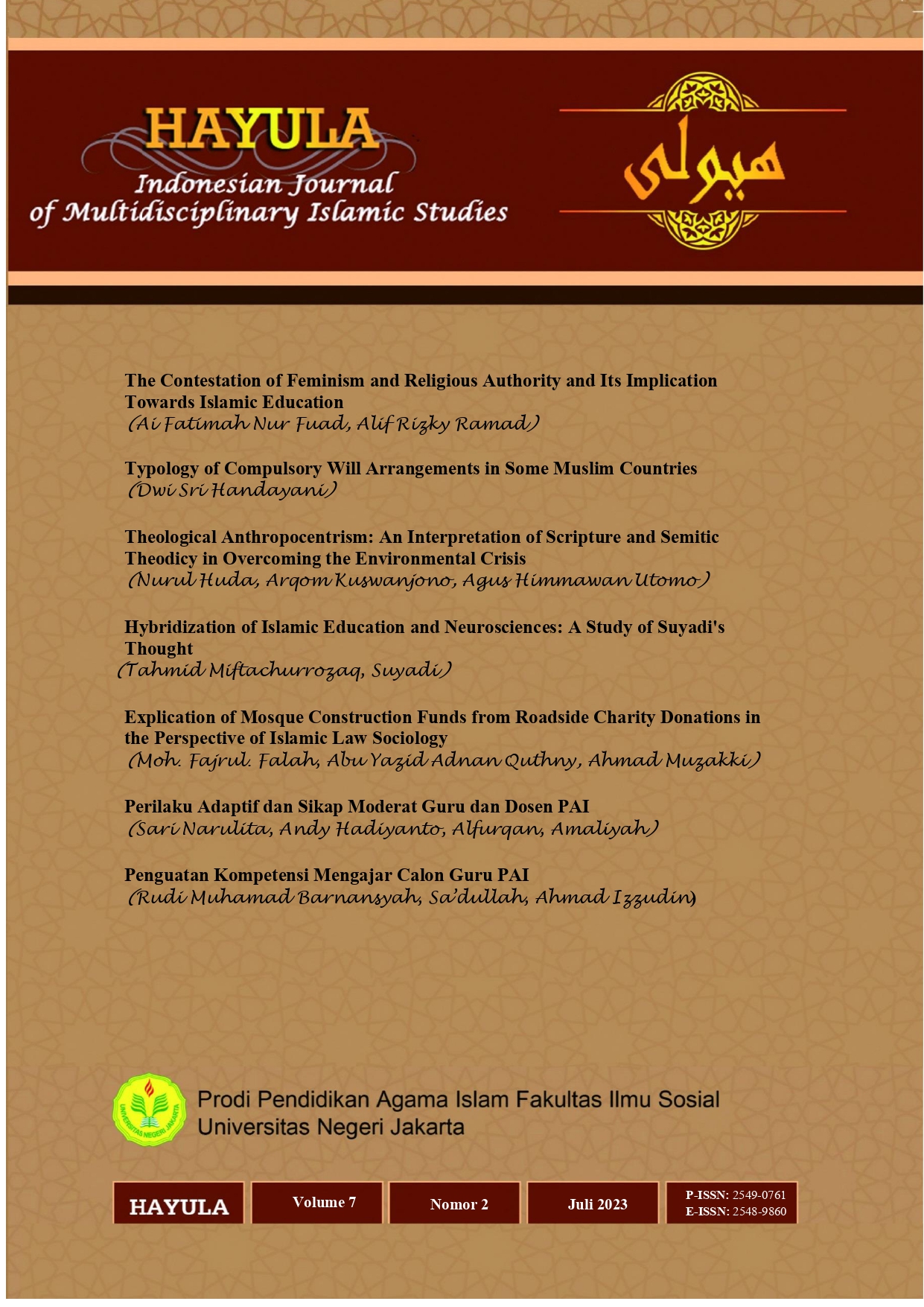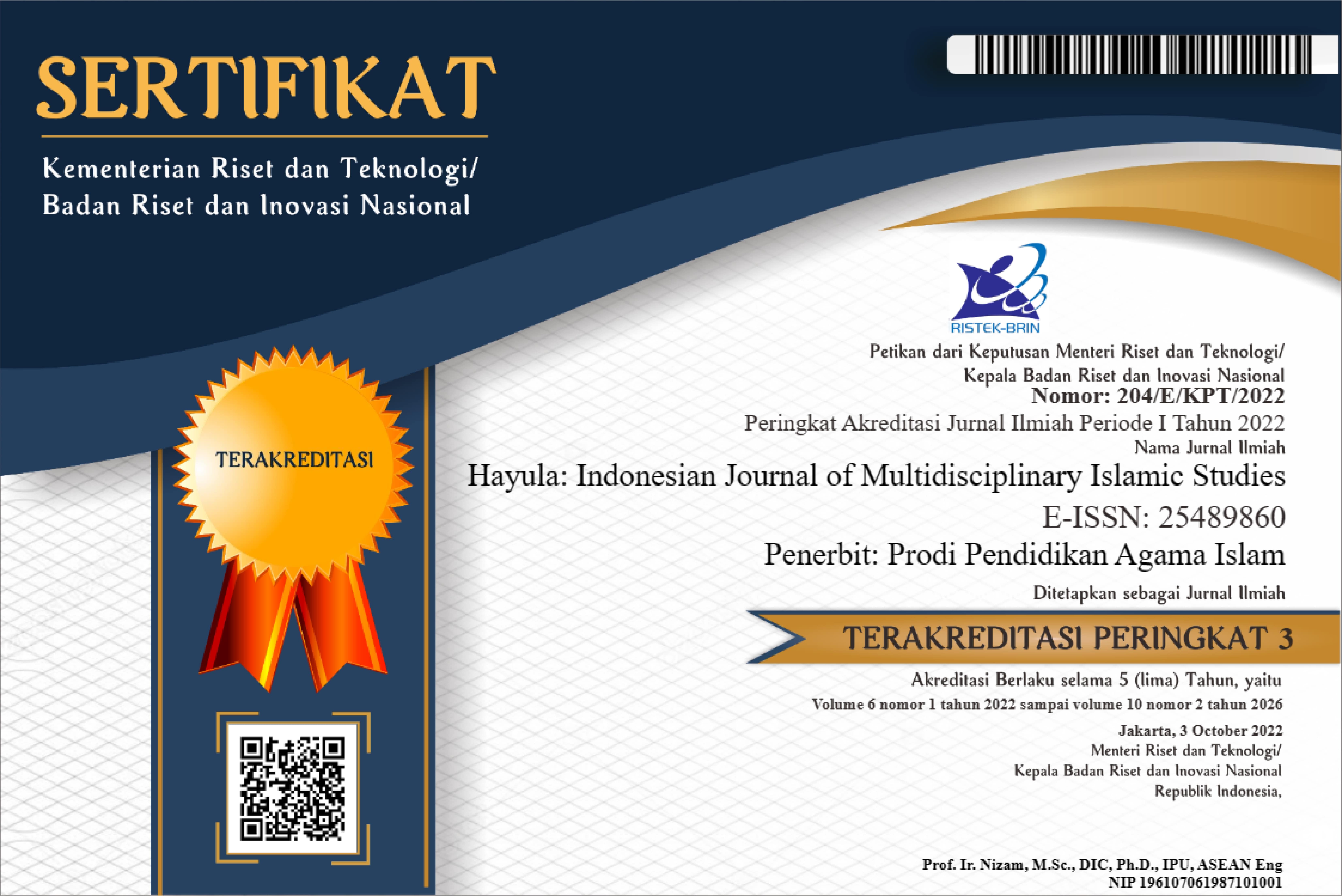Typology of Compulsory Will Arrangements in Some Muslim Countries
DOI:
https://doi.org/10.21009/hayula.007.02.02Keywords:
Compulsory Wills, Muslim States, CLustersAbstract
This paper intends to look at the arrangements related to the provisions in the distribution of inheritance in several Muslim countries and group mandatory wills into clusters. This research uses a literature study (Library Research) that explores data based on pre-existing data with a comparative juridical approach that will be a comparison of laws from one country to another. The findings in this study that there are similarities and differences in the provisions of mandatory wills in various Muslim countries. The similarity can be seen from the clusters formed, namely there are 4 clusters related to the division of the State based on mandatory will regulations. The first cluster is Indonesia and Kuwait, the second cluster is Malaysia, Egypt and Tunisia. While the third cluster is Syria, Jordan, Morocco, and Syria. Then finally the fourth cluster is Pakistan, Turkey, Iraq and Iran. The four clusters have similarities that can be seen through: 1) the Provisions for Mandatory Wills and 2) the amount of inheritance obtained. While the difference lies in several grouping criteria, namely: 1) based on Islamic Law applied by Muslim countries, 2) the category of Mandatory Wills, 3) the Presntase of Mandatory Will Distribution, and 4) the requirements for the validity of determining heirs and the division of inheritance.
References
Ahsan Dawi, SH., SHI., MSI. “Pembaruan Hukum Keluarga Di Turki(Studi Atas Perundang-Undangan Perkawinan),” 2012, 8. https://www.scribd.com/embeds/93300992/content?start_page=1&view_mode=scroll&access_key=key-fFexxf7r1bzEfWu3HKwf.
Ariphia, Meydina Dwi, Fifiana Wisnaeni, Adya Paramita Prabandari, Progrm Studi, Magister Kenotariatan, Fakultas Hukum, and Universitas Diponegoro. “Perbandingan Pengaturan Pemberian Waris Pada Ahli Waris Non Muslim Di Indonesia Dan Malaysia.” Notarius 12, no. 2 (2019): 883–99. https://ejournal.undip.ac.id/index.php/notarius/article/download/29133/16792.
Destri Budi Nugraheni, Haniah Ilhami. Pembaharuan Hukum Kewarisan Islam Di Indonesia. Yogyakarta: Gadjah Mada University Press, 2014.
Erniwati, Erniwati. “Wasiat Wajibah Dalam Perspektif Hukum Islam Di Indonesia Dan Komparasinya Di Negara-Negara Muslim.” Jurnal Ilmiah Mizani: Wacana Hukum, Ekonomi Dan Keagamaan 5, no. 1 (2018): 63–74. https://doi.org/10.29300/mzn.v5i1.1437.
Fadhilah, Naily. “Pembaruan Hukum Waris Islam: Wasiat Wajibah Mesir Dan Relevansinya Dengan Konsep Waris Pengganti Indonesia,” 2021, 51–62.
Fitria, Vita. “Hukum Keluarga Di Turki Sebagai Upaya Perdana Pembaharuan Hukum Islam,” 1951, 1–15. https://media.neliti.com/media/publications/18111-ID-hukum-keluarga-di-turki-sebagai-upaya-perdana-pembaharuan-hukum-islam.pdf.
Habiburrahman. Rekontruksi Hukum Kewarisan Islam Di Indonesia. Jakarta: KENCANA, 2011..
Hidayati, Sri. “Ketentuan Wasiat Wâjibah Di Pelbagai Negara Muslim Kontemporer.” AHKAM : Jurnal Ilmu Syariah 12, no. 1 (2012): 81–90. https://doi.org/10.15408/ajis.v12i1.982.
Hisyam Qublan. Washiya Al-Wajibah Fi Al-Islam. Beirut: Mansyurat Bahr al-Mutawassith, 1971.
Jaenudin, Jaenudin. “Penerapan Dan Pembaharuan Hukum Islam Dalam Tata Hukum Turki.” ADLIYA: Jurnal Hukum Dan Kemanusiaan 10, no. 1 (2019): 19–34. https://doi.org/10.15575/adliya.v10i1.5144.
M. Anshar, Mk. Hukum Kewarisan Islam Dalam Teori Dan Praktek. Yokyakarta: Pustaka Pellajar, 2013
Manaf, Syahir. “Pengamalan Wasiat Wajibah Di Mahkamah Syariah Negeri Sembilan Berdasarkan Peruntukan Enakmen Wasiat Orang Islam Negeri Sembilan 2004,” no. March (2020).
Muhamad Asni, Muhammad Fathullah Al Haq, and Jasni Sulong. “Fatwa on Wajibah Will and Unifomity of Provision in the Malaysian States Fatwa.” Al-Qanatir International Journal of Islamic Studies 5, no. 1 (2016): 1–15. http://al-qanatir.com/index.php/qanatir/article/view/42.
Nasrun, Moh., and Sulthon Fathoni. “Positifikasi Hukum Keluarga Di Dunia Muslim Melalui Pembaharuan Hukum Keluarga.” Islamika : Jurnal Ilmu-Ilmu Keislaman 20, no. 01 (2020): 63. https://doi.org/10.32939/islamika.v20i01.568.
Nofiardi. “Wasiat Wajibah Dan Perkembangannya.” Al-Hurriyah 10, no. 1 (2009).
Nor Azlina Abd Wahaba, Norafifah Ab Hamidb, Norajila Che Manc& Rawi Nordind. Faraid Dan Hibah: Persediaan Ke Arah Pencen Hakiki. Physics Today. Vol. 10, 1957. https://doi.org/10.1063/1.3060178.
Rosyid, Maskur. “Kriminalisasi Terhadap Hukum Keluarga Di Dunia Muslim.” Al Amin: Jurnal Kajian Ilmu Dan Budaya Islam 3, no. 1 (2020): 175–93. http://jurnal.stitalamin.ac.id/index.php/alamin/article/view/48.
Seri Pustaka Yustisia. Kompilasi Hukum Islam. Yogyakarta: Pustaka Widyatama, 2004
Shesa, Laras. “Keterjaminan Kedudukan Dzaul Arham Dalam Kewarisan Islam Melalui Wasiat Wajibah.” Al-Istinbath : Jurnal Hukum Islam 3, no. 2 (2018): 145. https://doi.org/10.29240/jhi.v3i2.615.
Syafi‟i. “Wasiat Wajibah Dalam Kewarisan Islam Di Indonesia” 02 (2017): 119–30. https://media.neliti.com/media/publications/271167-wasiat-wajibah-dalam-kewarisan-islam-di-48def31a.pdf. Tafsir Web. “Surat Al-Baqarah Ayat 180.” tafsirweb.com, n.d. https://tafsirweb.com/681-surat-al-baqarah-ayat-180.html.
Tafsir Web. “Surat Al-Baqarah Ayat 180.” tafsirweb.com, n.d. https://tafsirweb.com/681-surat-al-baqarah-ayat-180.html.
Tohir Muhammad. Familli Law Reform in the Moeslem Word. Bombai, 1972.
Tri Nugroho, Ishak, Muhammad Akbar, and Suhri Hanafi. “Perkembangan Perundang-Undangan Hukum Keluarga Muslim Di Mesir ( Studi Wasiat Wajibah Di Mesir).” Familia: Jurnal Hukum Keluarga 1, no. 1 (2020): 1–20. https://doi.org/10.24239/familia.v1i1.1.
Umar Faruq Thohir. “Pembaharuan Hukum Waris Islam Di Turki.” Asy-Syari’ah : Jurnal Hukum Islam 5, no. 2 (2019): 181–201. https://doi.org/10.36835/assyariah.v5i2.121.
Wajdi, F. (2020). Transnational religious movement. Routledge International Handbook of Religion in Global Society.
Yusuf Somawinata. “Wasiat Wajibah; Konsep Dan Pelaksanaannya Dalam Hukum Positif Di Indonesia,” n.d.
Yasin Yusuf Abdillah, S.H.I., M.H. “Perbandingan Penerapan Hukum: Konsep Wasiat Wajibah Antara Kompilasi Hukum Islam Indonesia Dengan Enakmen Negeri Selangor Malaysia” 4, no. 1 (2016): 1–23. https://badilag.mahkamahagung.go.id/artikel/publikasi/artikel/konsep-wasiat-wajibah-antara-kompilasi-hukum-islam-indonesia-dengan-enakmen-negeri-selangor-malaysia-oleh-yasin-yusuf-abdillah-s-h-i-m-h-2-1.
Downloads
Published
How to Cite
Issue
Section
License
Authors who publish with this Journal agree to the following terms:
- Author retain copyright and grant the journal right of first publication with the work simultaneously licensed under a creative commons attribution licensethat allow others to share the work within an acknowledgement of the work’s authorship and initial publication of this journal.
- Authors are able to enter into separate, additional contractual arrangementfor the non-exclusive distribution of the journal’s published version of the work (e.g. acknowledgement of its initial publication in this journal).
- Authors are permitted and encouraged to post their work online(e.g. in institutional repositories or on their websites) prior to and during the submission process, as it can lead to productive exchanges, as well as earlier and greater citation of published works.
Users/public use of this website will be licensed to CC BY







